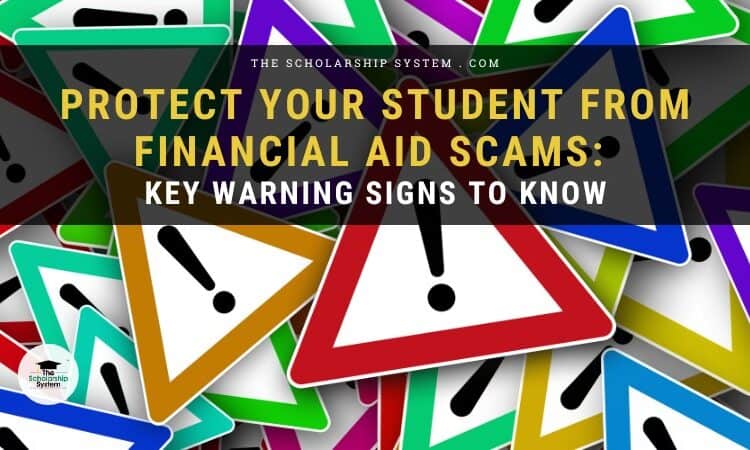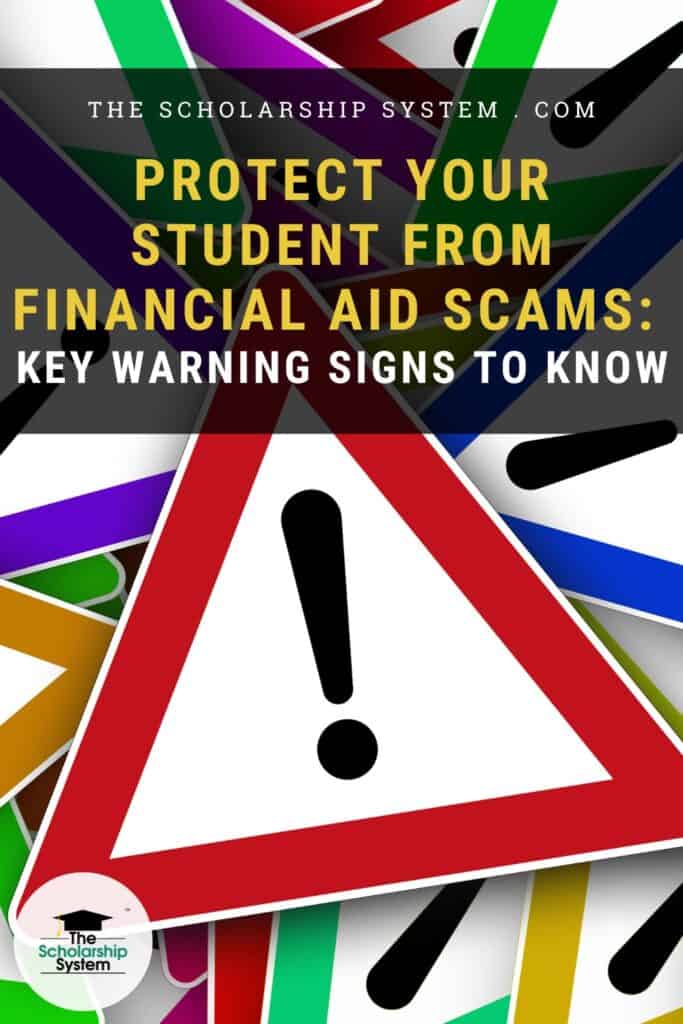Updated on March 30th, 2025
College is an exciting time filled with opportunities, but navigating the financial aid process can feel overwhelming. Unfortunately, scammers take advantage of students who are eager to secure funding for their education, using deceptive tactics to steal personal information and money. With so many emails, calls, and offers promising scholarships or loan forgiveness, it can be difficult to tell what’s real and what’s a financial aid scam. The good news is that a little bit of awareness goes a long way in staying protected.
If your student wants to find legitimate scholarship opportunities, we can help! Sign up for our free college scholarship webinar to learn more about the scholarship process! Head over to http://thescholarshipsystem.com/freewebinar to reserve a spot today.
Scammers often use urgency and official-sounding language to trick students into acting quickly without questioning the legitimacy of an offer. Whether it’s a promise of guaranteed aid, a request for upfront fees, or a message claiming to be from a government agency, these red flags can help spot scams before they cause harm. Understanding the common warning signs makes it easier to make informed decisions and ensure that financial aid is coming from trusted sources.
Contents
Warning Signs of Financial Aid Scams
Scammers often target students struggling with student loan debt relief by offering seemingly easy solutions to consolidate or eliminate their loans. Be especially cautious of unsolicited offers promising immediate results or requiring upfront payments. Scammers frequently request an up-front or monthly fee while promising immediate and total student loan cancellation.
Many of these fraudulent schemes claim to have insider access to loan forgiveness programs or exclusive ways to reduce payments, but in reality, they are designed to steal money or personal information. A legitimate student loan servicer will never demand payment before providing assistance or guarantee unrealistic outcomes.
Language designed to create urgency is another common tactic used to pressure students into making rushed decisions. Phrases like “limited-time-only” or “exclusive offer” are meant to discourage students from doing their own research before committing.
Scammers know that the more time a student takes to verify their claims, the more likely they are to uncover the truth. Any offer related to federal student loans should always be verified through trusted sources like the Department of Education or official federal student aid websites to ensure its legitimacy.
Red Flags in Communication
Scam artists go to great lengths to make their communications appear convincing, often using official-looking names, seals, and logos to appear legitimate. However, these elements alone do not guarantee trustworthiness.
Emails and phone calls that claim to be from a student loan servicer or the Department of Education should be carefully examined for inconsistencies. One of the easiest ways to spot a student aid or student loan scam is by looking for grammatical errors, typos, or oddly worded messages—common signs that something isn’t right.
Students should also be wary of any request for sensitive information, such as Social Security numbers, FSA passwords, or bank account details. A major red flag is a demand to sign over power of attorney or third-party authorization forms, as this could allow scammers to take control of loan accounts. The U.S. Department of Education and its partners will never ask for your StudentAid.gov username or password.
Always verify the sender’s email address and research the legitimacy of the organization before responding. Student loan borrowers should remain cautious and take the extra step of confirming any financial aid communication with their official federal loan servicer. Emails from the U.S. Department of Education will only come from official addresses ending in .gov.
Legitimate Loan Servicers and Debt Relief Help
When managing federal student loans, working directly with a trusted loan servicer is the safest approach. These servicers operate on behalf of the government, assisting students in navigating repayment options and even guiding them toward loan forgiveness if eligible.
Unlike debt relief companies that charge for similar services, legitimate loan servicers provide free assistance to help students understand their repayment plans and explore loan consolidation if needed. Verifying the servicer’s identity and ensuring they are officially recognized by the Department of Education is essential in avoiding a student loan scam.
Some debt relief companies may offer services that sound appealing, but they often charge unnecessary fees for assistance that a loan servicer provides for free. If a student is struggling to make payments, the first step should always be contacting the loan servicer directly. They can provide personalized guidance on repayment plans, deferment, or forbearance options without any upfront cost. Being proactive and working with the correct resources helps prevent falling victim to deceptive financial schemes.
Managing Your Loan Payments
Keeping track of student loan payments and account details is one of the best ways to avoid fraudulent schemes. Some scammers claim they can handle payments on behalf of students, promising convenience while secretly diverting funds for their own gain. Any third party that requests to pay a loan servicer each month should be treated with caution. A legitimate servicer will never pressure students into making immediate payments or signing up for financial products that seem unnecessary.
Ensuring account information remains up-to-date and secure is also essential in preventing unauthorized changes. Scammers may attempt to alter loan terms or redirect payments to fraudulent accounts.
Verifying the legitimacy of any communication from lenders before responding helps students maintain control over their repayment process. Taking a cautious and informed approach when managing loans ensures that payments go directly toward reducing debt rather than falling into the hands of bad actors.
Reporting and Recovering from Scams
If a student suspects they have fallen victim to student loan scammers, taking immediate action can help minimize the damage. The first step is to report the incident to the Federal Trade Commission and the state’s Attorney General’s office, as these agencies investigate fraudulent activities and work to hold scammers accountable. Additionally, contacting the student’s loan servicer and any banks or credit card companies associated with their federal loan can help prevent further financial losses. Alerting these institutions ensures that necessary steps are taken to secure accounts and stop unauthorized transactions.
Changing passwords and monitoring credit reports are also essential in protecting against further harm. Student loan forgiveness scams often involve identity theft, making it crucial to update login credentials and track any suspicious financial activity.
If a student believes a company has acted unlawfully or violated regulations, filing a complaint with the U.S. Department of Education can help bring attention to the issue. Taking these steps quickly can increase the chances of recovering from a scam while preventing others from becoming victims.
Staying Safe from Scams
Staying informed and cautious is the best defense against student loan scams. Before making any financial decisions, students should research the company and its reputation to verify its legitimacy.
Private companies may offer assistance with student loan forgiveness, scams, and repayment programs, but many of these services come at a cost. In contrast, federal loan servicers provide free services to help students manage their debt without unnecessary fees. Any unsolicited offers that request personal or financial information should be treated with suspicion.
Verifying the identity of any person or company contacting a student about loans is an important habit to develop. Scammers often use aggressive tactics, urgent messaging, and promises of quick relief to create pressure. Keeping account information secure, staying up to date on student loan scams, and recognizing red flags can prevent fraud before it happens. With awareness and caution, students can confidently navigate their loan repayment journey while avoiding unnecessary risks.
If your student believes that graduating debt-free is part of overall student success, we can help! Sign up for our free college scholarship webinar to learn more about the scholarship process! Head over to http://thescholarshipsystem.com/freewebinar to reserve a spot today.







Leave a Reply